Introduction: A Visit to Šibenik
After our stay in Split, we decided to visit the small, authentic & friendly port city of Šibenik. A perfect stop along the beautiful Dalmatian coast. On our way from Split to Zadar.
- Šibenik has little over 31 000 inhabitants. Around 43 000, if you take into account the whole municipality.
- The port city is located slightly inland, with a natural opening to the Adriatic Sea. Seafarers can only reach its quay through the St. Anthony Channel. The fact that it was somewhat hidden & well protected made Šibenik from its foundation a coveted prize for powerful neighbours, like the Venetians & Ottomans (see below).

This post will – after a short historical introduction – give you an idea of Things to Do in & around Šibenik.
This blog post is written with the help of my daughter Lisa, who shared her own experiences with me touring Croatia.
- IMPORTANT MESSAGE: Throughout this post you’ll find affiliated links & ads provided by the travel platforms like Expedia & GetYourGuide. Links & ads that may help you plan & fill in your next trip to Croatia.
- If you click on them & buy a ticket for a museum or a tour a small commission of your purchase will go to me (Paid by the provider, without any extra cost to you!).
- If you first want to learn a little bit more about me, the blog writer, please click on: Better call me Art.

A Brief History of Šibenik, Croatia
As I did in my earlier post on Split, I’d like to start by giving you an idea of Šibenik’s history. Mainly because when you visit the center of this beautiful city you will feel the past at every corner. A past which took off much later than Split or Zadar, but is as interesting.
- Instead of a Greek or Roman foundation, Šibenik has primarily a Slavic origin. The earliest recorded mention of the city dates back to 1066 AD, during the reign of the Croatian King Petar Krešimir IV, also the Great.
- From the start Šibenik developed as a port city. A place which was soon known for its – strategically perfect – inland location, but also its role as a trading station and for its shipbuilding. No wonder, neighbouring powers – like the Byzantines, the Hungarians, Venetians & later on, the Ottomans – wanted to incorporate Šibenik into their sphere.
- From the 15th century until the end of the 18th century, Šibenik – like many other coastal areas of Croatia – was part of the Venetian Republic. The city’s architecture & culture were significantly influenced by the Venetians.
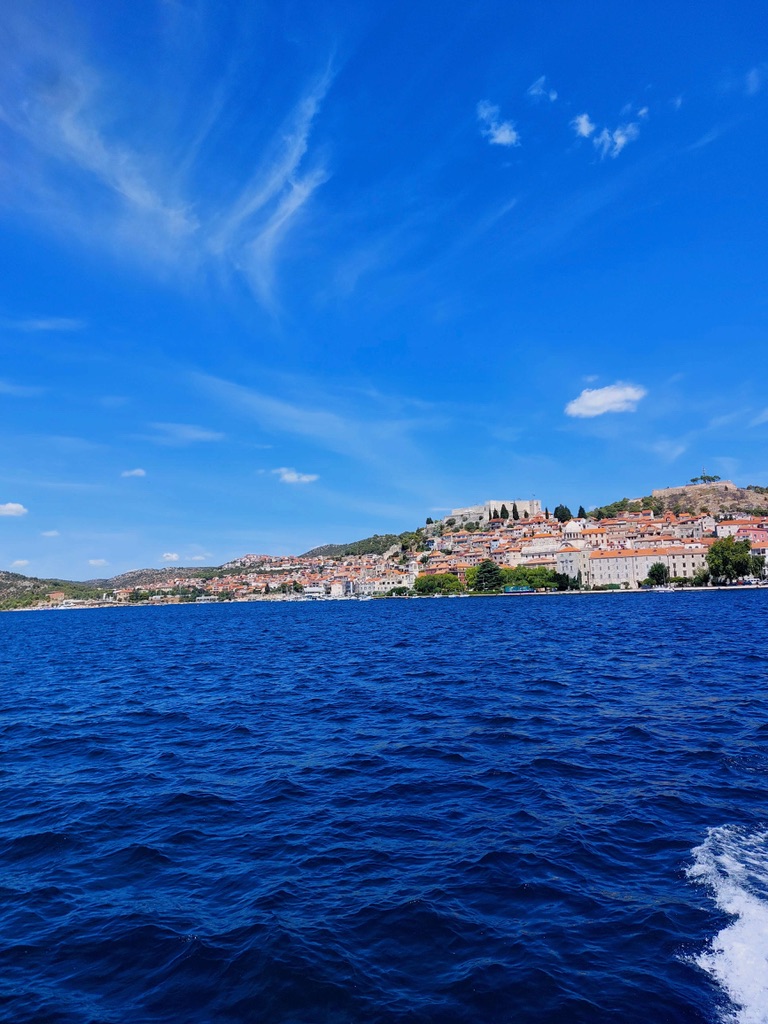
- During this time, the Ottomans regularly tried to conquer Šibenik, as well as other coastal cities nearby. The city’s fortifications – still standing today & one of the Šibenik’s main attractions – played a crucial role in defending the place successfully against these large-scale attacks.
- After the fall of Venice (1797), Šibenik came under the rule of the Austrian Empire. As the vast Central-European empire of the Habsburgs had relatively little coastline, the city’s development as an important Mediterranean port continued, while its cultural-historical heritage was preserved.
- After the First World War – in 1918 – Croatia was incorporated in the new state Yugoslavia. Until 1991, when it became an independent republic.
Today, Šibenik is rapidly becoming a popular tourist destination – certainly during the summer months. Not only because of its rich history & stunning monuments, but also for its natural surroundings. The beautiful beaches & national parks nearby.
In other words, Šibenik is a perfect base the city & its surrounding area.
Visit Šibenik: Main attractions in the city
Visit Šibenik: The Fortresses
Because of its location Šibenik was on many a target list of neighbouring powers. Certainly the Ottomans. Reason for the city to construct several fortresses. Three on land & one at sea. All still standing & worth your visit.
St. Michael’s Fortress
The oldest one is St. Michael’s Fortress (13th century). It’s located closest to the city center. Atop a high, steep rock, not too far from the Dalmatian coastline. Offering breathtaking views of the bay, the St. Anthony’s Channel to the Adriatic Sea & the mouth of the Krka River.
- The Fortress is named after a church on the same spot, which was devastated by a fire in 1663. A church dedicated to St. Michael, the patron saint of Šibenik. A revered figure in the Christian tradition, often depicted as an Archangel battling Satan. You can spot his image all over town.

Although the earliest foundations of the St. Michael’s Fortress bring us back to at least the 13th century, these are almost all covered up by centuries of expansions & renovations. Until recently.

Nowadays – besides visiting the fortress – you can regularly enjoy cultural events at this historical monument. That is, open-air concerts or movies (during the summer months), as well as interesting expositions.
For more info, go to: Events at St. Michael’s Fortress
The Barone Fortress
The 17th century Barone Fortress was built more inland than St. Michael’s Fortress & still stands high above the inner city of Šibenik.
- Instead of being named after a Christian saint, this fortress received its name from a German baron, Christoph Martin von Degenfeld. The man who commissioned its construction in 1646, when the Ottomans were threatening the city with another attack.
TravelTip: The beautiful Barone Fortress – which was renovated just recently – is probably the historically most interesting fortress to visit in Šibenik. Mainly, every visitor can use a tablet which – while touring the fortress – shows videos of the monuments history, including a Virtual Reality Guide.
Besides that, the views over the city & bay from the Fortress outer walls are spectacular. Certainly when the sun is setting. Additionally, there is a café & terrace where you can have a coffee or drink.
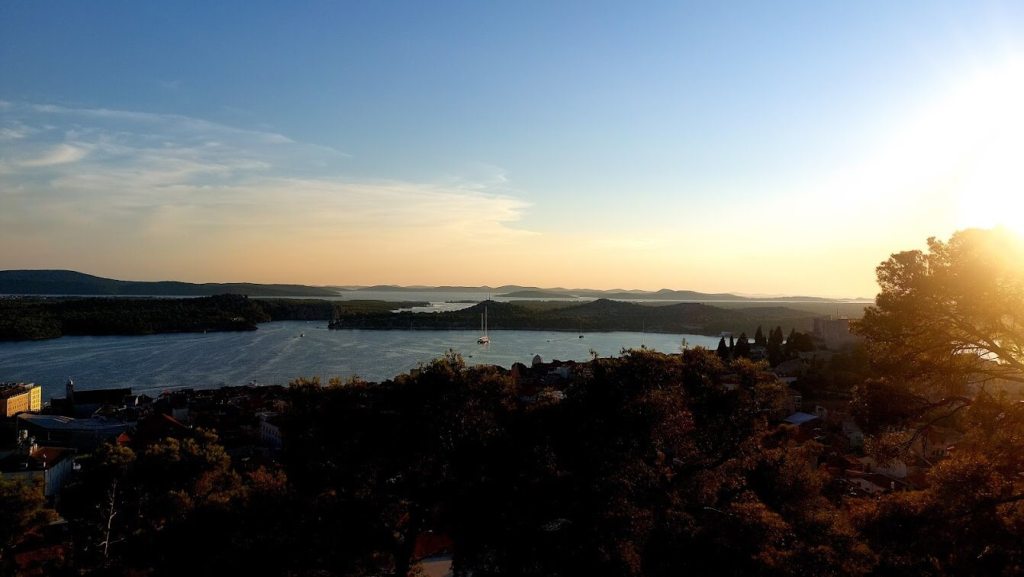
Enjoying spectacular views of the city & the sea in front.
Just like the St Michael’s Fortress, the Barone is used for concerts (jazz) & open-air cinema during the summer months.
To learn more, go to: Barone Fortress Events
St. John’s Fortress
The St. John’s Fortress was built at the same time as the nearby Barone Fortress (17th century). Obviously with the same goal in mind, to protect Šibenik against an immediate threat from the East,… the Ottomans. It stands highest of all the fortresses around the city.
- Just to underline the “immediate threat”: the St. John’s Fortress was built in just 58 days. And not just that, it was built & financed by the inhabitants themselves. Its name is derived from an earlier church on this spot.

This impressive fortress was also recently renovated & opened to the public. Complete with a bar/terrace & a shop. The most popular visiting hour is just before the sun sets, bestowing visitors with another beautiful view of Šibenik & its surroundings.
TravelTip: Besides the old fortress, you can visit a more modern bunker as well. It was built within the fortress by the Germans, who occupied this stronghold in 1943-44, after the Italians had left.
To learn more, go to: St. John’s Fortress
Tickets for or Tour of the Fortresses
Tickets
TravelTip: Instead of buying individual tickets for one of the fortresses (€11,50), you can purchase a collective ticket for all three fortresses mentioned so far (€13,00). The ticket is valid for 7 days, so you can spread your visits over several days. (WARNING: the 4th fortress at sea isn’t included in this ticket, see below).
For more info on tickets & prices, go to: Tickets to the Šibenik Land Fortresses
A Tour
A good alternative is to get a guided tour of all Three Fortresses, including Eco-friendly transport, organised by GetYourGuide.

For more info, click on: Eco City Fortresses Tour Šibenik
St. Nicholas Fortress
Last, but not least I’ll present to you the St. Nicholas Fortress. This impressive monument is located at the entrance to the St. Anthony Channel, on the Island of Ljuljevac. Its main goal – obviously – was protecting Šibenik from the sea.
- This fortress was built by the Venetians in the 16th century, also mainly to avoid an Ottoman invasion. It got its name from a monastery which had to be demolished to be able to build the fortress.

The St. Nicholas fortress was opened to the public in 2019. Until 1979 it functioned as a military base for Yugoslav and later on Croatian soldiers.
- Just like the St. John’s, this fortress was occupied by the Italians & Germans during the Second World War. Again the Germans made adjustments. One of them, a tunnel in the rock underneath the fortress – locally called the Hitler’s Eyes sea tunnel. Mainly to allow boats to access/leave the city avoiding Allied underwater mines.
TravelTip: Because of the ongoing restoration the only way to actually visit the fortress & tunnel nowadays is to take a boat trip organized by the Public Institution Nature of the Šibenik-Knin County.
For more info or to get tickets for this trip, go to: Visit to the St. Nicholas Fortress, Šibenik
Alternatively, you can get a good first impression of the Fortress & Tunnel when booking the GYG Boat Trip to the Kornati National Park. A tour that leads you to many other highlights along the beautiful Dalmatian Coast.
For more information, go to: Kornati Boat Tour
Visit Šibenik: St. James Cathedral
The inner city’s most iconic landmark is the St. James Cathedral. A monument that captures your attention from the moment you catch your first glimpse. Doesn’t matter which nearby corner you turn, when exploring beautiful Šibenik.
No surprise either is the fact that it’s a UNESCO World Heritage Site (since 2000).
Here’s for some interesting facts about the St. James:
- Although the idea of constructing a large cathedral in Šibenik dates back to 1298, construction began in 1431. Completing the St. James took over a century, until 1536.
- The St. James is built entirely of stone – brought in from the islands nearby – without any mortar or cement, a testament to the skill of its architects and builders.
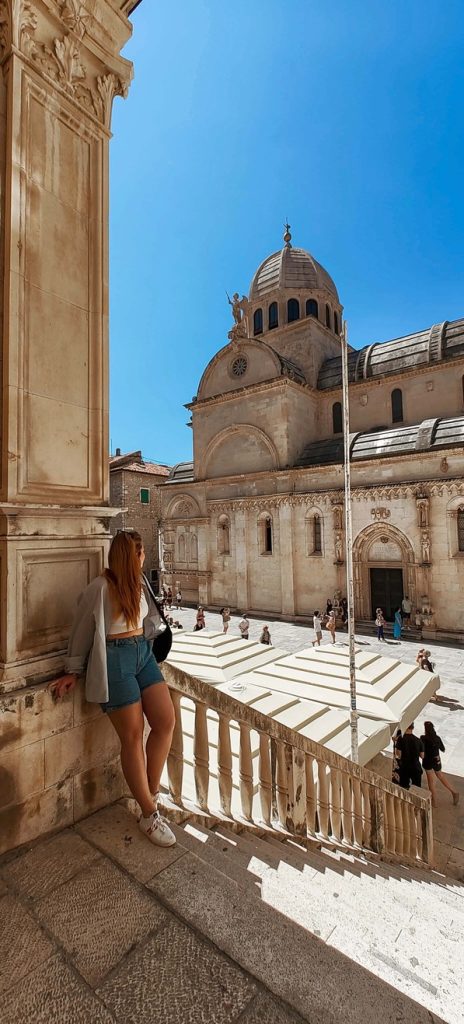
- The cathedral blends elements of both Gothic & Renaissance styles, creating a harmonious and visually stunning structure. In short, an eye-catcher.
- When you enter the church you will be surprised anew. The interior is adorned with the most exquisite religious artefacts. Artful sculptures of saints, biblical scenes & historical figures.
In a few words, the St. James Cathedral is a MUST visit when in Šibenik. A visit you will not forget easily…. Well, that’s never!
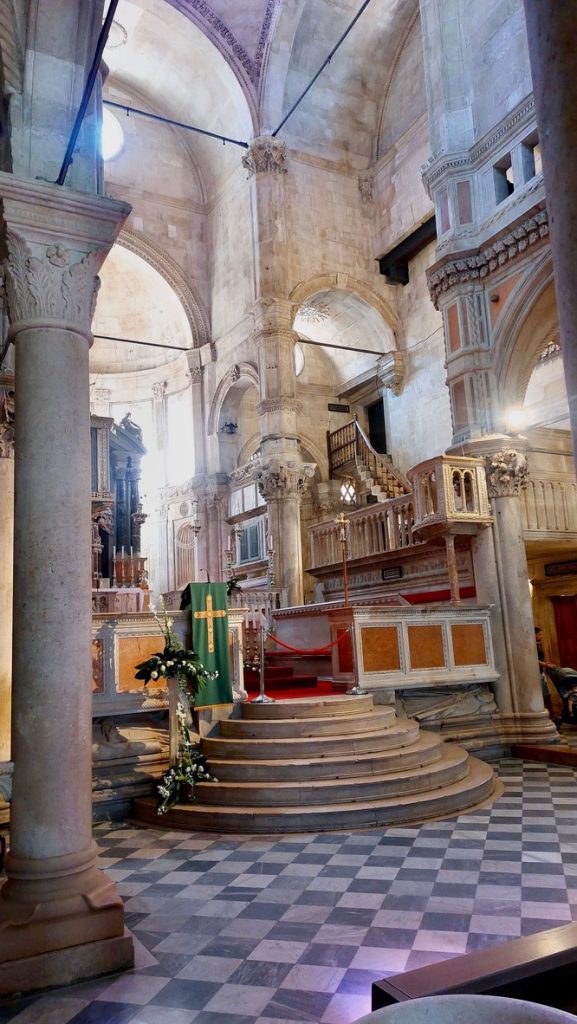
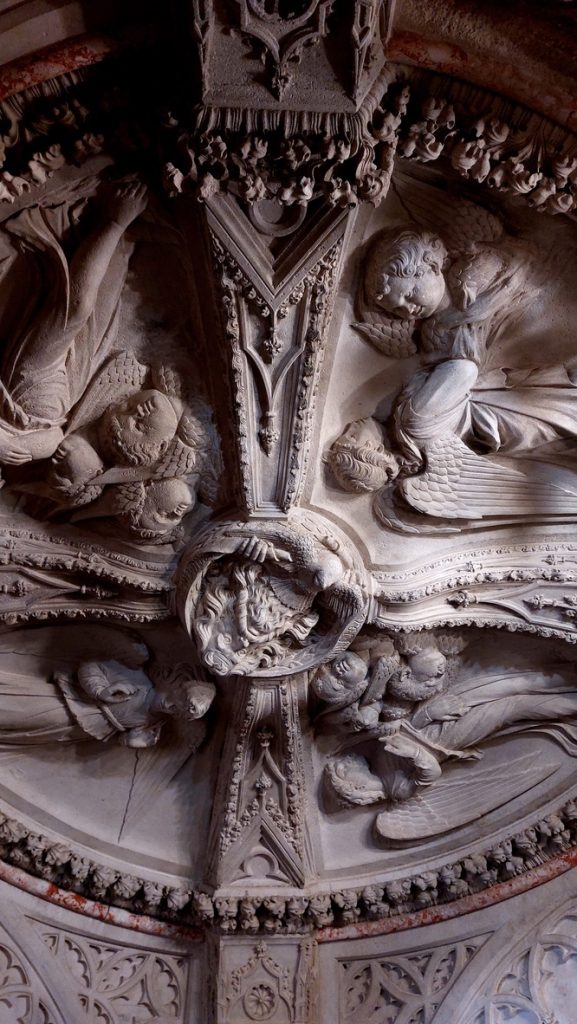
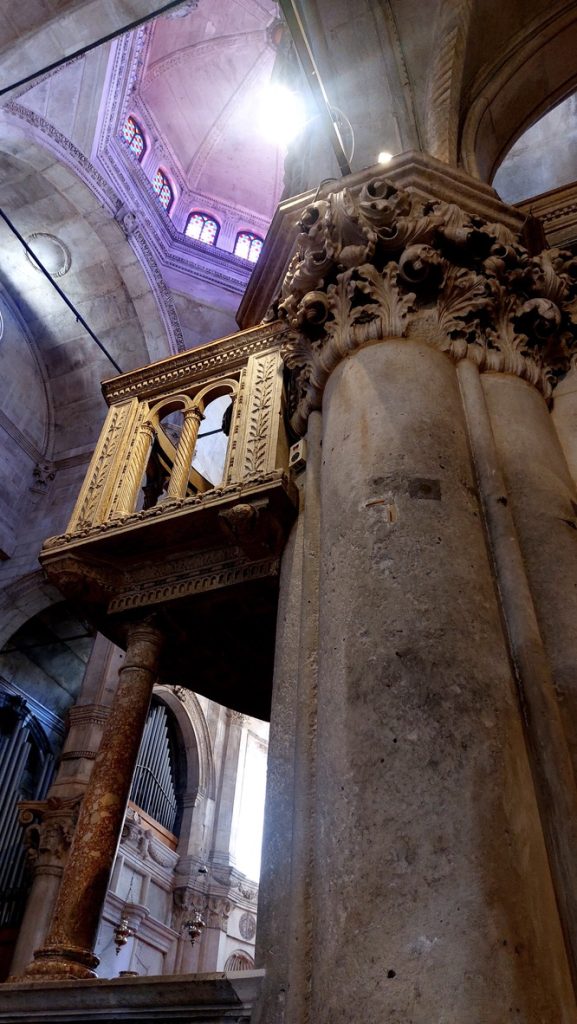
The beauty of St. James Cathedral in Šibenik, inside…
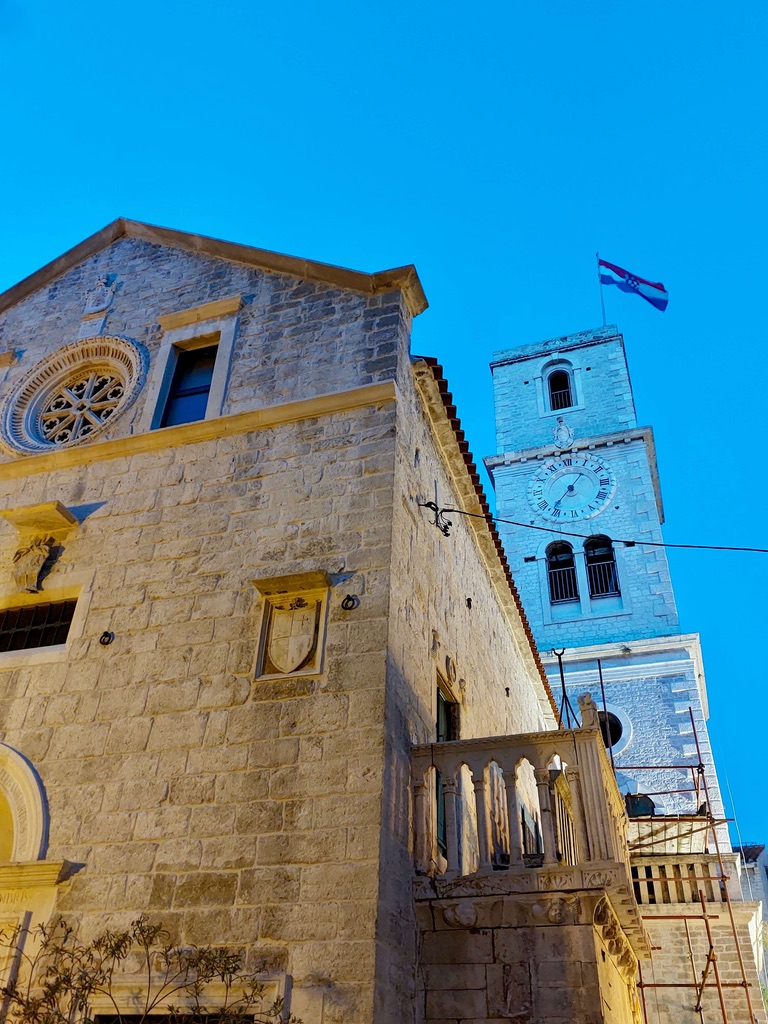
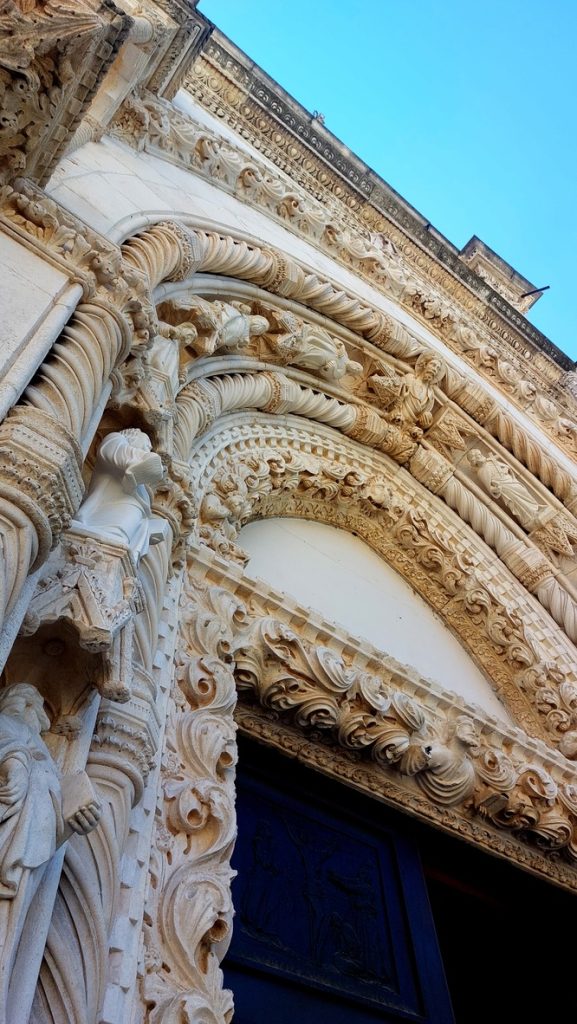
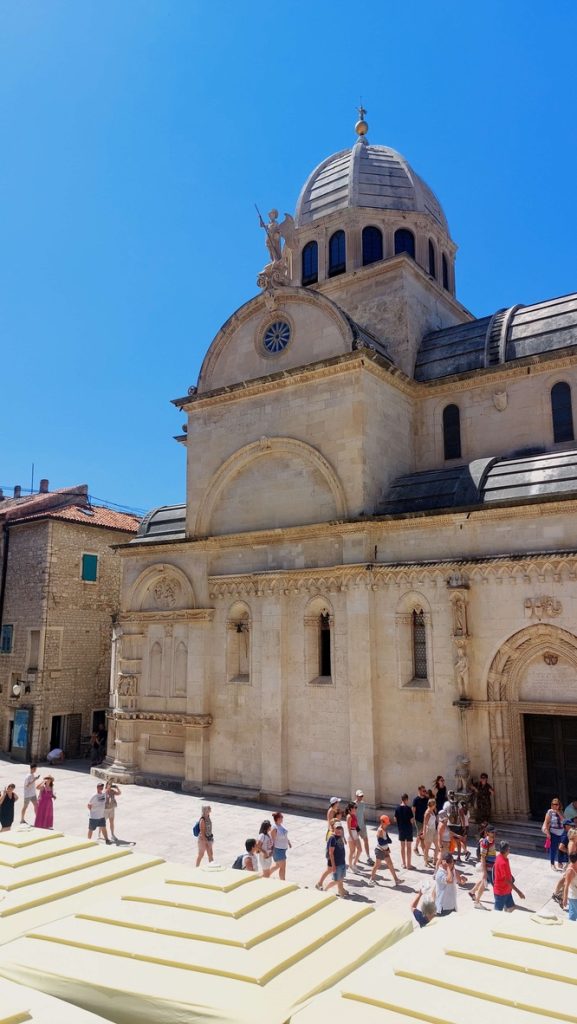
…and out.
Museum Civitas Sacra
Close to the Cathedral, you’ll find the Museum Civitas Sacra – housed within the Galbiani Palace.
This museum offers a unique, interactive exploration into the city’s rich sacred heritage. Its focus is mainly on the St. James – its history & construction – but not exclusively. Besides that, there’s much attention for the “Venetian” past of the city.
Afterwards you can visit the Palace’s rooftop, to enjoy beautiful panoramic views of the city & Adriatic Sea + a drink and/or snack, if you like.
TravelTip: With your ticket to the St. James Cathedral you have FREE admission to the Museum Civitas Sacra
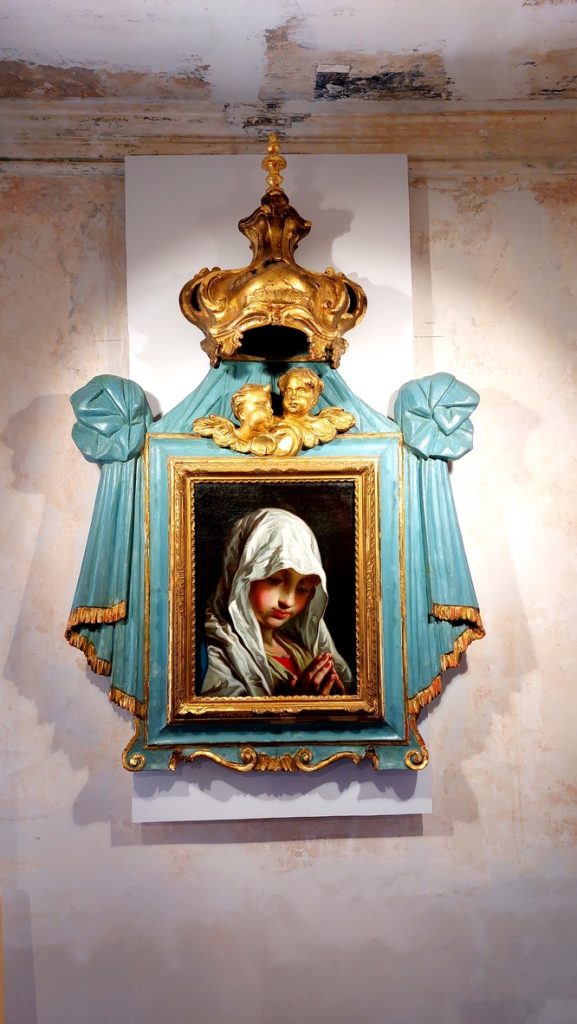
For more info, go to: Museum Civitas Sacra
Visit Šibenik: Walking tours of the inner city
If you want to know more of Šibenik’s fascinating past, you can go on a walking tour. There are several professional & locally guided tours to choose from.
First of all, there’s the shorter 1 hour tour of the city center during the day.
To learn more, go to: Šibenik walking tour in one hour!

When staying in Šibenik though, I’d highly recommend you to take: The Evening Tour of Šibenik (1.5 hours)
WARNING: Both walking tours include a visit to St. James and other inner city monuments, but not the fortresses.

Visit Šibenik: Stroll the inner city on your own
With or without an organised tour, it’s really a pleasure to stroll the beautiful inner city of Šibenik on your own. Besides the monuments & squares, you’ll encounter many mysterious alleyways which remember times gone by.
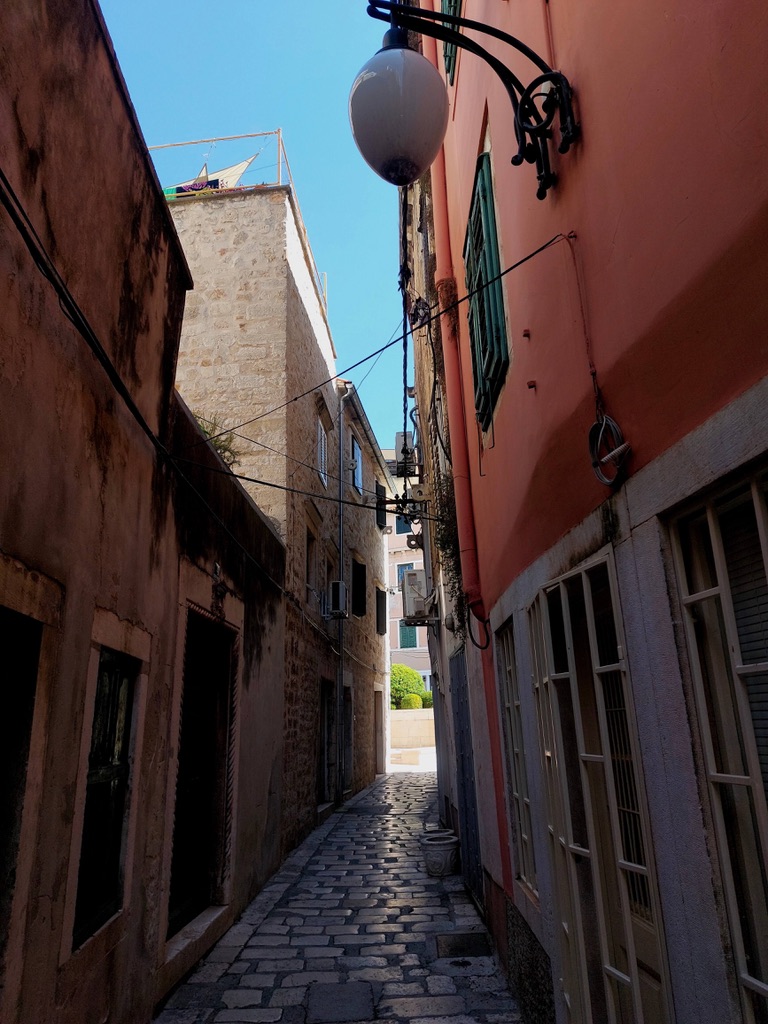
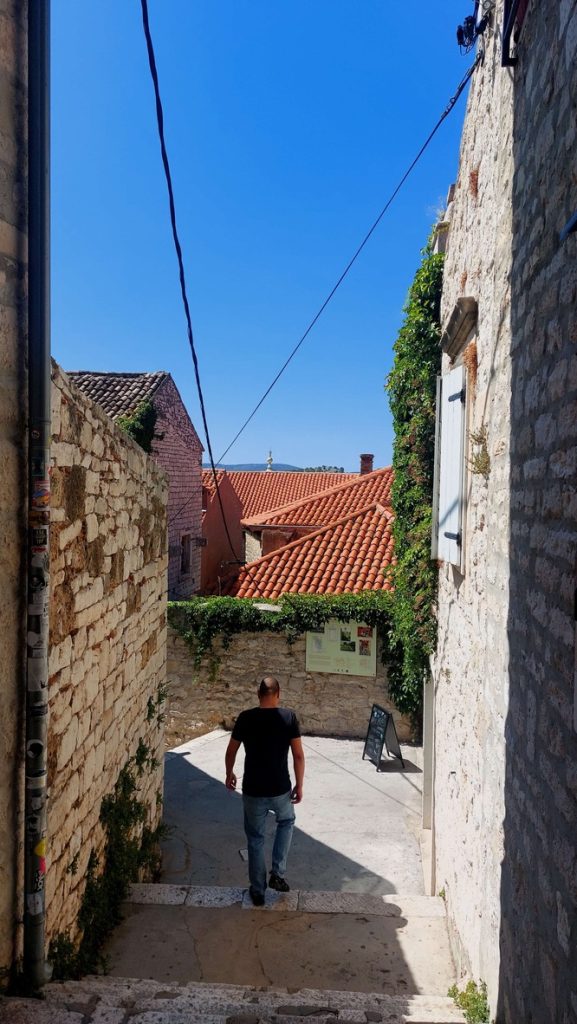
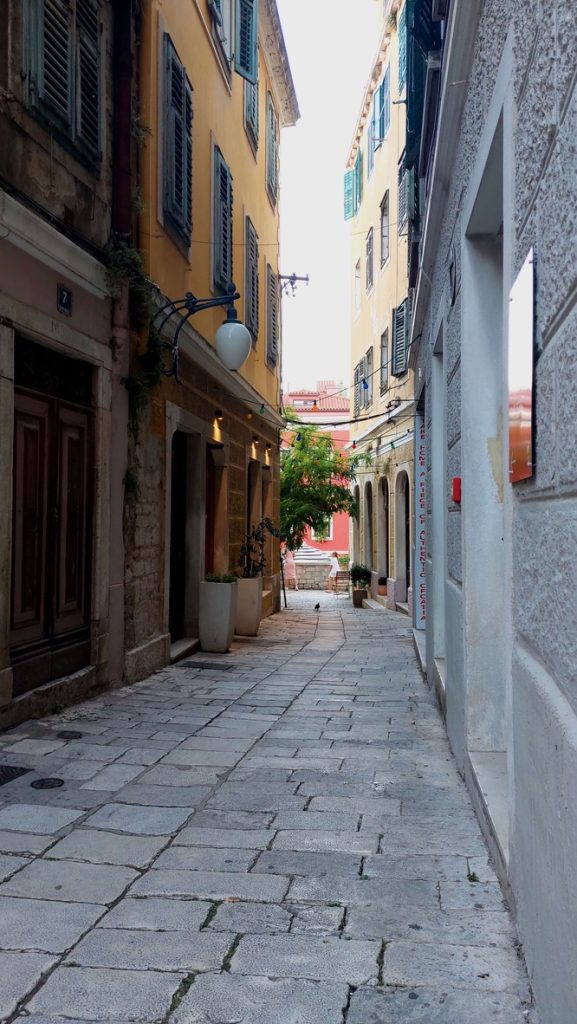
Impression of the beautiful alleyways criss-crossing the inner city of Šibenik.
WARNING: As Šibenik is built on a hill, the narrow streets often lead up or down steep inclines. The many steps are a characteristic feature of the city’s unique charm, but may be challenging for some of you. That said, take your time, because while exploring you earn surprising views of the city & surrounding area from every angle.
Travel Tips: Getting Around in Šibenik
You can explore the city center of Šibenik only on foot. A fact that is applicable for many historical inner cities in Croatia, like Split, Zadar, Dubrovnik & others. If you have a (rental) car, park outside & put on your walking shoes.
For the attractions near Šibenik, you can use public transport or hire a taxi. That is – again – if you don’t have your own transport.
The best & and certainly most relaxing way though to fill in a (half) day trip is to go on a professionally organised, guided tour.
Although GetYourGuide offers less day-trips than from other destinations in Croatia, the few that they organise leave Šibenik by boat.
TravelTips: Personal Safety when you visit Šibenik
Like in Split before, we felt safe during our visit to Šibenik. From early morning until late at night, after leaving a restaurant or a bar. It didn’t matter if it was in the city center or on the quay.
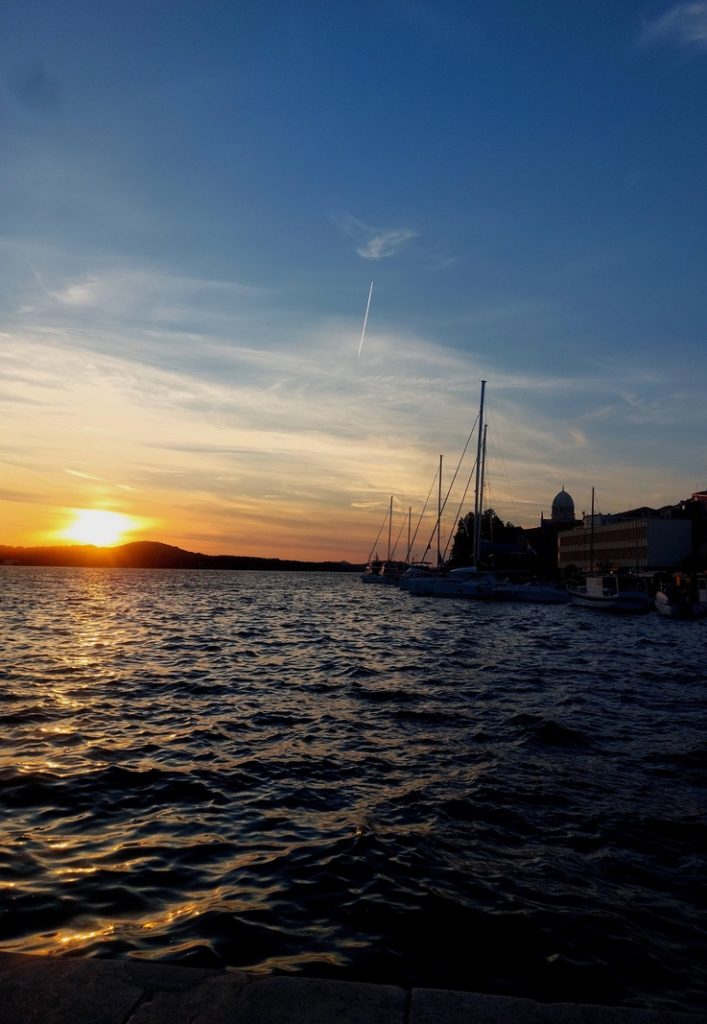
TravelTip: However, as with any tourist destination, it’s always important to use your common sense & take certain precautions. Just always be aware of your surroundings & don’t display personal valuables openly.
Visit Šibenik: Main attractions around the city
A day at the beach
As we travelled along the Dalmatian coast during summer, we didn’t forget to enjoy a day at the beach. Escaping the summer heat for a while.
We decided to cross over to Jadrija, in front of Šibenik – a peninsula, not an island. During the summer months (June-September) boats regularly leave Sibenik’s harbour taking you through the St. Anthony Channel (duration: 20 minutes, €3).
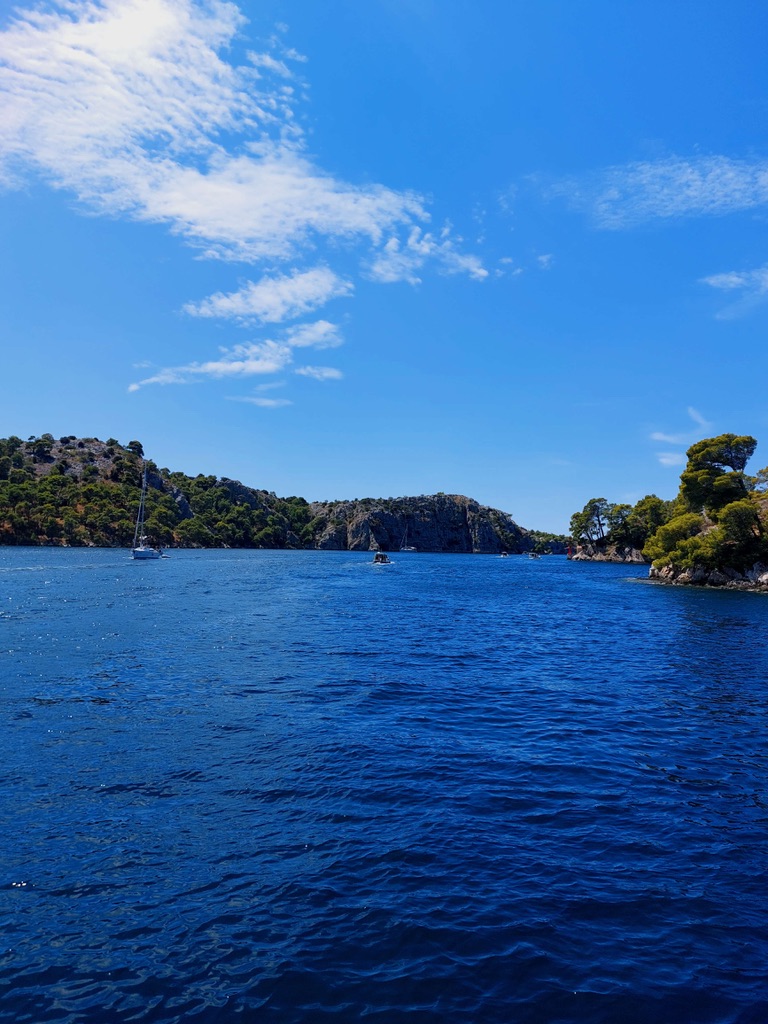
When you arrive at the island you can pick your own preferred beach spot. We walked on to Olive beach, where we hired a parasol & comfortable sun loungers for €20 + bought a drink & snack from the nearby bar.
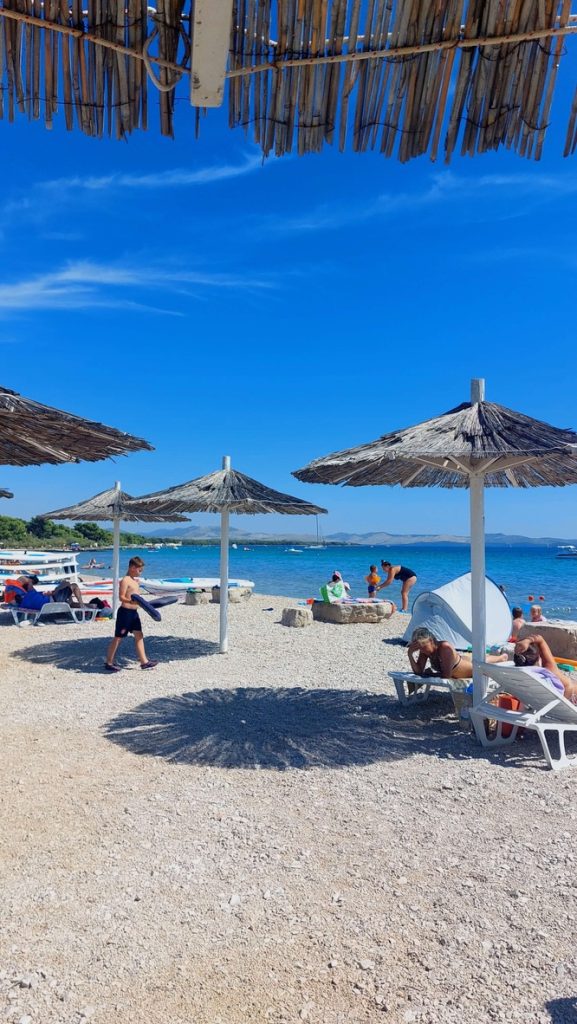
TravelTip: The beach at Jadrija is nice & beautiful but still somewhat rough. That’s why I’d recommend you to buy water shoes. Footwear which will also serve you on other spots along the Croatian coastline. Not only against stones & sharp rock, but also urchins.
Day trips from Šibenik, Croatia
In comparison with the bigger & more popular destinations like Split, Zadar or Dubrovnik, Šibenik offers less organised Day Trips. However, I’d like to present to you two unforgettable ones you may consider undertaking.
Visit Šibenik: Day Trip to Kornati National Park
After a first glimpse of the St. Nicholas Fortress (described above), this marvelous Boat Tour leads you to several other historical highlights of the Kornati National Park near Šibenik.
Besides cruising along the archipelago’s main attractions, there’s also time reserved to relax: swimming, snorkeling, cliff diving, sun bathing and/or just enjoying the beautiful surrounding area.

For more information, click on: Full-Day Trip to Kornati National Park by Boat
Visit Šibenik: Culinary Day Trip
A relatively new day trip from Šibenik, combines visits to historical monuments with culinary highlights. A tour mainly concentrated around the local Olive oil production, but also wine, cheeses, hams, amongst others.

To learn more go to: Culinary & Historical Day Trip
Visit Šibenik: Culinary Tips
Two restaurants I’d like to mention here, specialized in fresh (!) seafood:
Click on the restaurant’s name, to learn more & find its location.
First of all, a family run place – father & son – we found randomly walking the streets of central Šibenik: Pio.
Besides a friendly, personalized service they offered great plates all around. We went for a Fruti Di Mare & Smoked Mackerel. Both delicious and for that reason highly recommended.
Another excellent restaurant – recommended by locals – was the Konoba Marenda. A name referring to the local Croatian cuisine. Again we went for seafood: Fried fish & sardines.
And we were happy ever after.
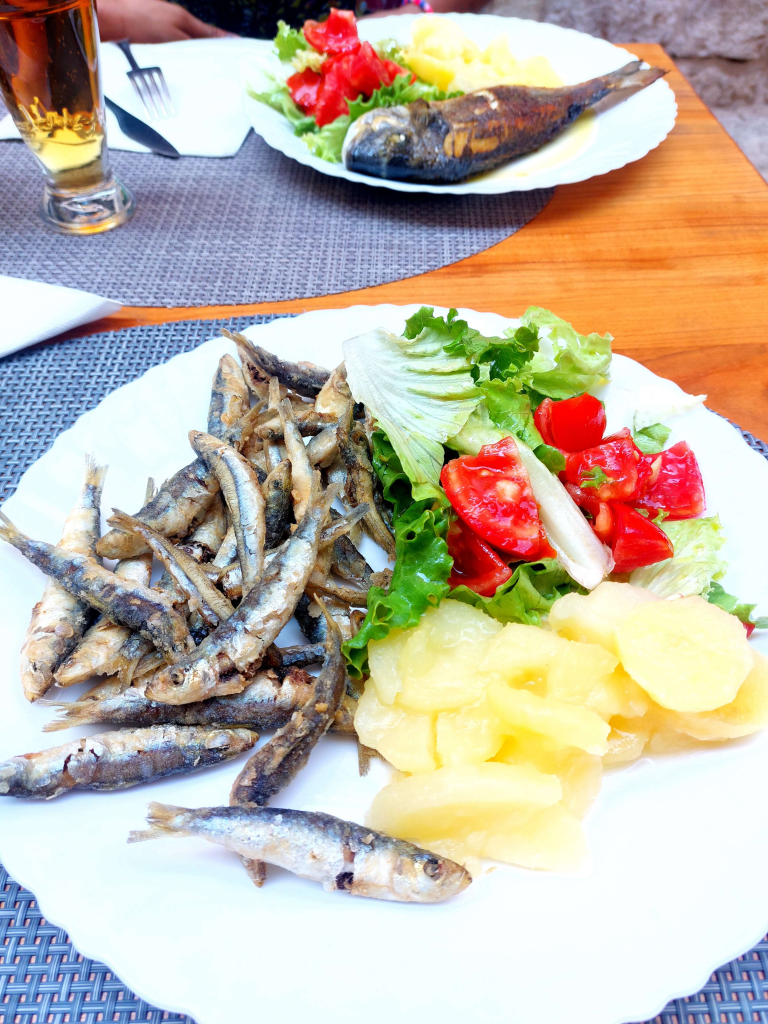
Šibenik: Where to stay
We loved the Amadria Park Beach Hotel Jure. A highly-rated 4-star beach resort, perfectly located just outside the city center.
Besides all the luxuries – like bright, modern rooms, several outdoor pools, a spa, good restaurants & direct access to the beach – the staff was professional & friendly.
In short, an excellent midrange hotel of which the price may surprise you!
For all these reasons, highly recommended!
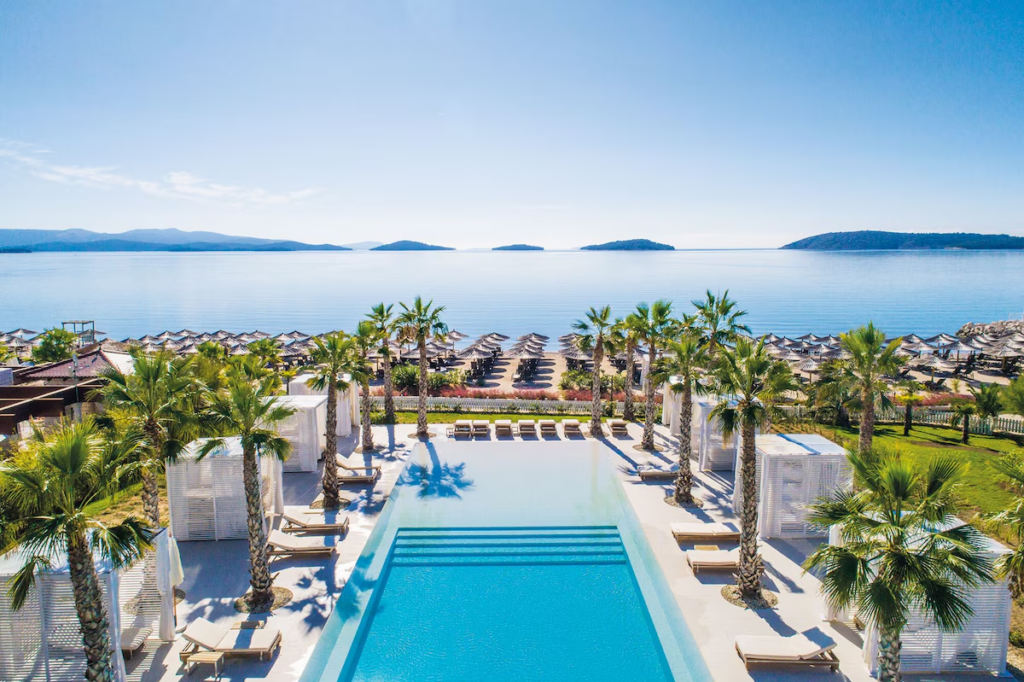
To learn more, click on the photo or go to: Amadria Park Beach Hotel Jure.
In conclusion: A visit to Šibenik
We considered it a good & lucky choice to have picked the smaller town of Šibenik as a stop between Split & Zadar. A friendly place with a relaxing vibe. That goes for its beautiful historical center, as well as its natural attractions nearby, including a perfect day at the beach.
In a few words, visit Šibenik. Include it in your itinerary if you like the idea of touring the most authentic parts along the coast of Croatia.
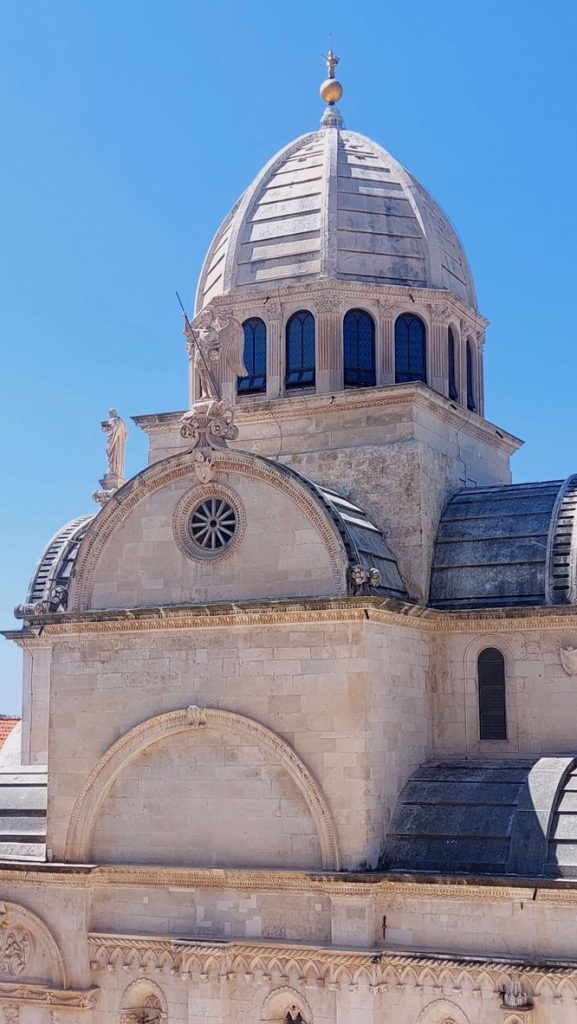
Visit Šibenik: More photo impression
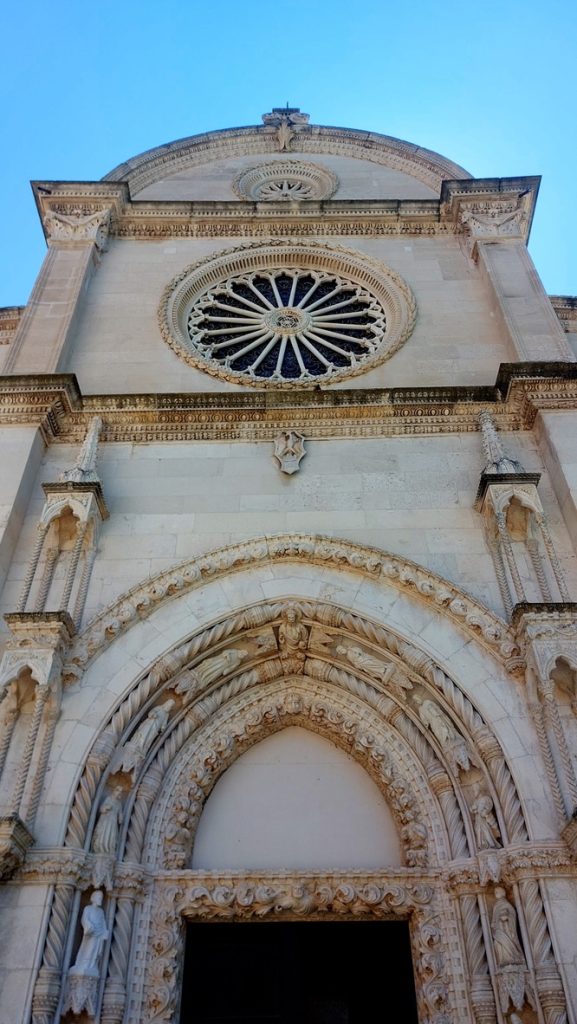
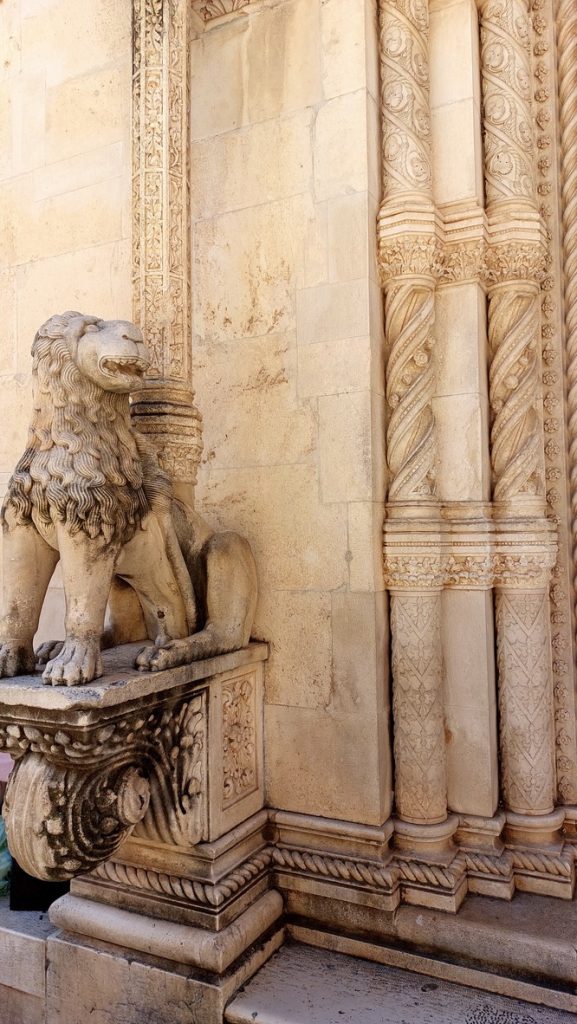

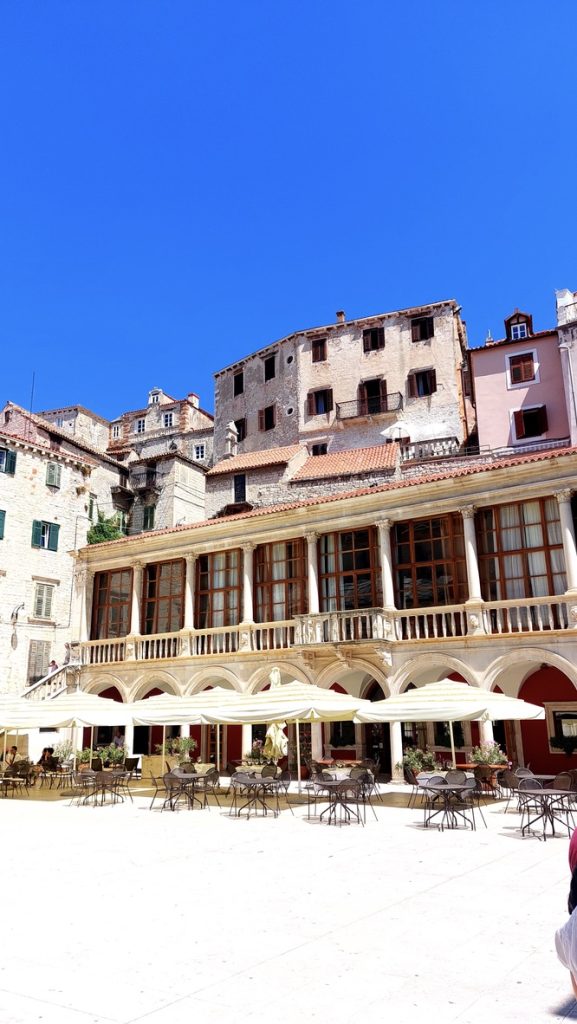
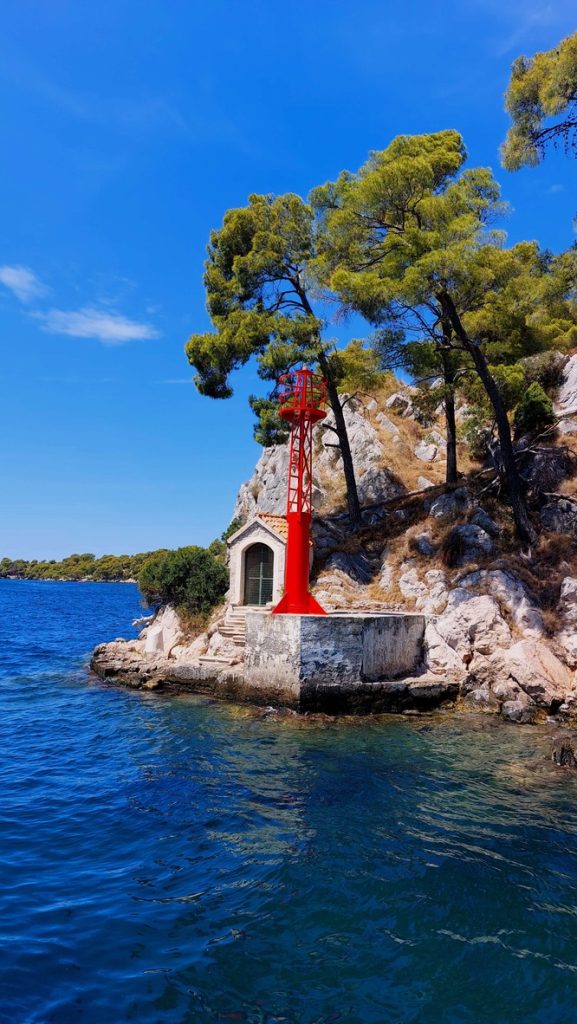

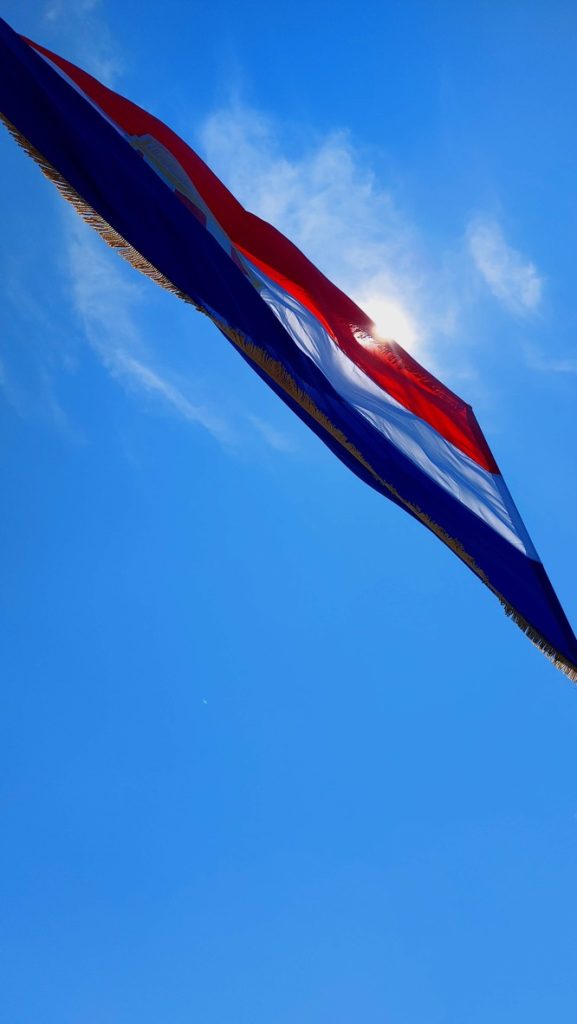
For more information of our previous stop, go to: Visit to Split, Croatia
For an overview of all travel posts of my blog, go to: My Home Page

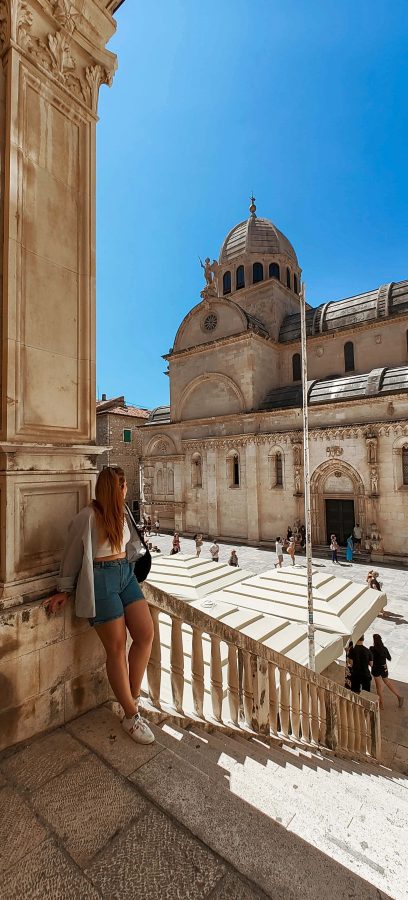
Comments
One response to “Best Tips & Ideas for a visit to the beautiful Croatian City of Šibenik”
[…] Best Tips & Ideas for a visit to the beautiful Croatian City of Šibenik […]